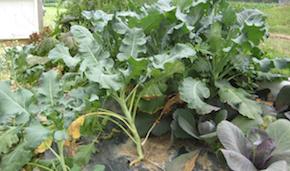For the past two years, something has been growing in the middle of Camp Pecometh, located in Centreville, Maryland: namely, a 1.5 acre sustainable garden. This all came about almost two years ago when new chef Chris Shultz proposed the idea to Pecometh management of starting a sustainable garden. He also suggested that his brother Matt, a horticulturalist who works in tech services for an agronomic products supplier, be allowed to contribute to the project. An agreement was made, and the rest, as they say, is history.
New Pecometh volunteer Michael H. McGrath, AICP, also contributed to the beginnings of the garden. From 1983 to June 2011, McGrath managed the work of the Delaware Agricultural Lands Preservation Foundation and the Planning Section in the Delaware Department of Agriculture, where he led the Department’s efforts in statewide land use planning and agricultural development. He used this knowledge when his daughter Joy approached him about starting a new student garden project at St. Andrew’s School in Middletown, Delaware. The school has a strong history, going back to the 1930s, of involving students in producing food for the school. In 2003, Mike and his daughter revived the program with a small garden which grew over a two year period into two acres. Since his recent retirement, he has passed on his knowledge to the next generation of students through the Penn Farm project, a collaboration with students from William Penn High School in New Castle, Delaware. Pecometh management knew that they needed Mike’s expertise when starting the sustainable garden, and the results have been well worth it.
Chris’ brother, Matt, was very beneficial to the project in adding insects to increase the ecological diversity of the garden. Three weeks ago, lace wing insects were released for generalist control of soft bodied insects. These insects are nicknamed Aphid Lions because they have two large mandibles (mouthparts) that they grab aphids (small sap-sucking insects) with and take out the inside portion. Also, three different types of parasitic wasps were released into the garden. These wasps attack aphids. Finally, Orius insects, those that feed on other pests like thrips, were introduced into the garden’s habitat. The beneficial insects were produced and donated by Syngenta Bio-Line, an international leader in this cutting-edge approach to eliminating the use of harmful chemicals. Matt also secured significant donations from his own employer, Harrell’s, Inc. Donations have included nutrients, fertilizers, fungicides and insecticides, all of which are certified for use in organic gardening.
The primary use of the garden’s bounty is to supply the dining operation for Pecometh’s Riverview Retreat Center (RRC). This means fresh, local produce for the buffet meals served to adult retreats, meetings and conferences at the RRC. In addition, a large amount of surplus produce has resulted from the hard work that has gone into the garden. Chef Chris has been donating the fruits and vegetables to local shelters and food banks, including an organization that helps down-and-out men in Elkton. Donations have also been made recently to Centreville United Methodist Church in Centreville, Maryland, and other establishments. Chris adds, “We’ve donated 10 cases of lettuce, and there’s 3 pounds to a case.” Chris is also excited about the crop this year, and how it helps others. “We’ve grown tomatoes, cucumbers, beans… this fall, we’ll plant pumpkins. The garden also helps to inspire our campers and guests to start gardens of their own.”
You can be a part of this effort by attending Pecometh’s 2nd annual Farm to Table Dinner where you’ll hear more from Chef Chris himself. The dinner will be held on Sunday July 27 at 4:30pm. Seating is limited so make sure to purchase your tickets early by calling Pecometh Camp and Retreat Ministries at 410-556-6900 or visiting them online at pecometh.org.



Write a Letter to the Editor on this Article
We encourage readers to offer their point of view on this article by submitting the following form. Editing is sometimes necessary and is done at the discretion of the editorial staff.